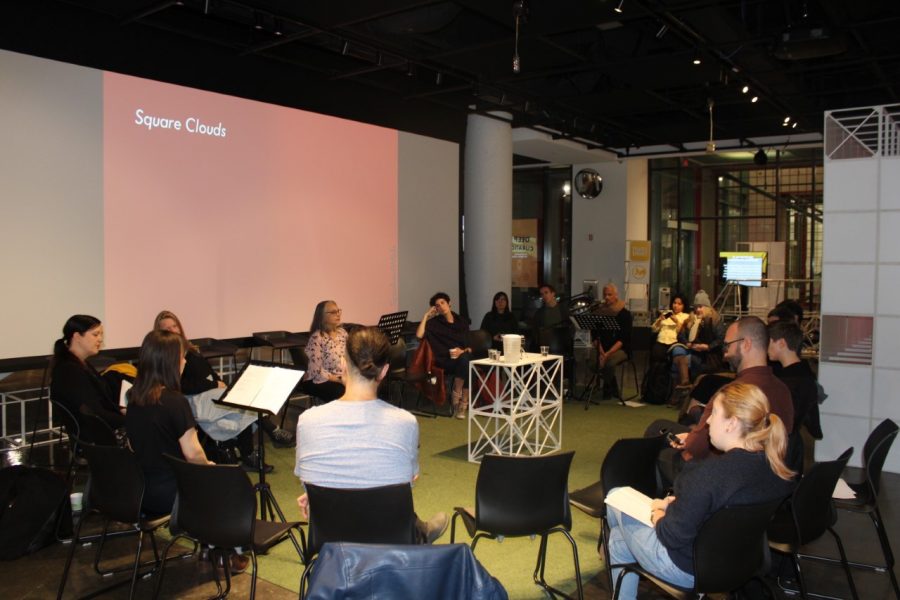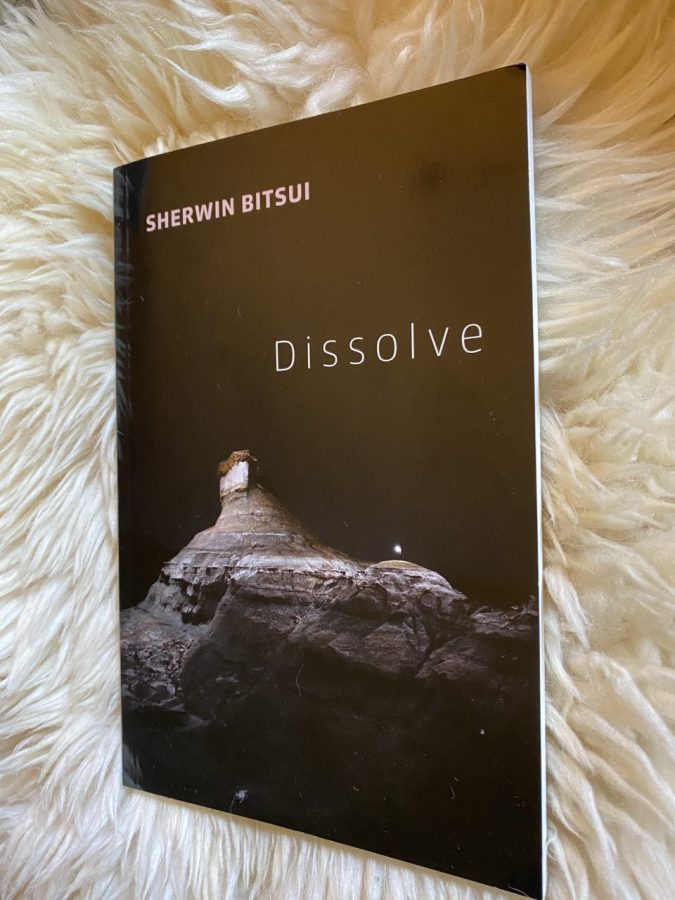
This is an excerpt from Issue 3.44 (Summer, 2021). Order a single copy of the issue or subscribe today to read the piece in its entirety.
…
Klara du Plessis: I love poetry readings, but am often bored by them, whether attending or participating. Both in my creative and curatorial practice and in my scholarly research, I’ve been driven to think critically about literary curation and to knead the discipline into a more intentional site for the presentation and sharing of poetic work in performance.
It’s tricky to generalize, and there’ll always be many wonderful counterexamples, but I do wonder why the conventional, contemporary North American poetry reading as a relational form often fails to engage the poetic work (as well as the poet and the audience) it aims to present. As we’ve discussed privately before, Elee, many poetry events expect the poet to appear cold, without context beyond a factual bio, without links to poets presenting alongside them, and without the requisite space to expand into their own performance or for the audience to sink into a sense of activated comfort with the poetry performed. Since 2018, I’ve been experimenting and developing Deep Curation,¹ a practice of literary event organization. This curatorial practice attempts to move beyond the variety show model of the poetry reading to create events that allow for dialogues between poets and poems. It deliberately navigates structures of scripting, improvisation, and collaboration, and includes methods such as excerpting and choral performance towards a complete reconfiguration of literary works into a new, collective production. In a brilliant, co-authored essay, Karis Shearer and Erín Moure call for “a new paradigm for the poetry reading and its study,” suggesting that “the best poetry readings to see and hear are self-reflexive performances that deliberately disrupt the notion of the author as definitive interpreter of their own work.”² Materializing this kind of thinking intrigues me …
Elee Kraljii Gardiner: Yes! A catalyst for me to start doing things differently as a host and programmer was the publication of my second poetry collection, Trauma Head, a long experimental poem-memoir about having an arterial dissection and stroke. I was aware that retreading excruciating details night after night on tour could be dangerous to my mental health and my reading of the work. I made some rules towards protection: I would read sequentially through the book, picking up on the page I had ended on in the previous reading and never excerpting the poem so as to avoid returning to the “high-drama” place a short-term audience might attach to instantly: the sexy, movie-trailer clip of the book that could also seduce me as a default choice at the cost of understanding the process of the text. This has been a helpful rule because I am experiencing the book as a whole object, becoming familiar with the flow and narrative, learning what the book does as an entirety. It also makes the hours before a reading very calm: no agony about choosing which poems to read!
With Trauma Head I knew I needed positive energy around me, so I thought about the best conditions, dream conditions, for a reading. What I came up with was a pre-launch event, an intimate circle by invitation. I wanted to be with people who are not only clever readers of poetry but also either know me or know what it is to deal with neurological alterity. We met the night before the launch at Massy Books in Vancouver, where the public launch would be. I placed chairs in a circle, lit candles (since artificial light can be really taxing, visually) and we had a mellow discussion before I read from the book a bit. I spoke about the genesis of the project and how I wrote it. Sitting around me were Patricia Massy, Fred Wah, Pauline Butling, Daphne Marlatt, David Chariandy, Sophie McCall, Stephen Collis, Amanda Rheaume, Kevin Spenst, Juliane Okot Bitek, Miriam Moses, Adrienne Gruber, and Anne Stone. Several people took turns trying out reading techniques for the poems such as two voices, reading parts of a poem over each other. We tried positioning ourselves back-to-back and facing each other, reading the poem backwards, and reading lines in call-and-response. We were talking the book into existence and I felt that I was discovering it in some ways for the first time. I found myself wondering why the poetry community doesn’t make the type of space necessary for this kind of discovery more, why we shortchange the author when it comes to experience with the book.

KdP: I admire your awareness of what you needed from a book launch of Trauma Head and how you were able to navigate that need with gentleness but also precision. We talked on the phone about this maybe a year ago and I enjoy thinking about your embodied choice to warm the bookstore space a day before the public event with an intimate group of friends and writers.
With the advent of COVID-19, I similarly felt the need to experiment with organizing a non-standard book launch for my new book Hell Light Flesh, keeping it as small as possible rather than the default: as large as possible. I scheduled three six-person discussions in Montréal’s Jarry Park. Each event centred around three short readings from the book, followed by a dialogue that lasted between sixty and ninety minutes in total. In attendance were a varied group of colleagues and friends who all brought their mindsets and experiences to the event. Discussions were rich and thrilling. This series of events, held among people I trust, served as a workshop for me to think about how I want to talk about my new book. It was a challenging and even risky experience of exposing myself and my book in a way that is not usually required at a book launch. Probably as a result, it was also the most satisfying engagement with my writing I’ve ever experienced: an activated, durational listening and analysis that celebrated my book through real generosity of time, energy, and thought. The beautiful intimacy of these events makes me reflect on the potential value of insular communities and consider how a warmth from closeness might be transmitted to the more democratic, public-facing event. I’ve started thinking about these Hell Light Flesh park launches as part of my Deep Curation practice. Although the Jarry Park discussions were way more minimal in their presentation of poetic material than most of the other Deep Curation poetry readings I’ve created, they similarly sprung from an intention to frame the structure through which authors and their poetic practices engage with an audience through performance.
EKG: I would love to see a script for a Deep Curation event. My own experience of deeper attention made me wonder about a place that could hold a book for as long as the text needs. Sachiko Murakami told me the term for what I wanted to try was a “whole cloth” reading, which comes from the term for when the pages of the book are not yet cut and the text appears on one long roll of paper or cloth. So, the series was born under that name.³
Sherwin Bitsui’s Dissolve had just come out and it had the necessary threads: The book is cohesive, it builds a world, and it isn’t longer than is manageable to absorb in one sitting. Selfishly, I also love listening to Sherwin read. I knew that the environment mattered. People had to be able to relax into listening well. UBC’s Green College offered to host us in their cottage living room, which was the perfect venue.
…

¹ Since its inception in 2018, Klara has hosted eight Deep Curation events across Canada and internationally, with the intention to continue once COVID-19 protocols allow. Further reflections on how the event has evolved can be found on this episode of The SpokenWeb Podcast.
² Erín Moure and Karis Shearer, “The Public Reading: A Call for a New Paradigm.” Public Poetics: Critical Issues in Canadian Poetry and Poetics, eds. Bart Vautour, Erin Wunker, Travis V. Mason, and Christl Verduyn (Waterloo: Wilfrid Laurier University Press, 2014), 271-87.
³ The Whole Cloth reading series launched in February of 2020, with plans to hold sessions featuring authors in different locations across North America. Future events will be posted here.
“Exiting the Schedule of the Poetry Reading: Klara du Plessis and Elee Kraljii Gardiner in Conversation” is excerpted from Issue 3.44 (Summer 2021). Order a single copy of the issue here!

